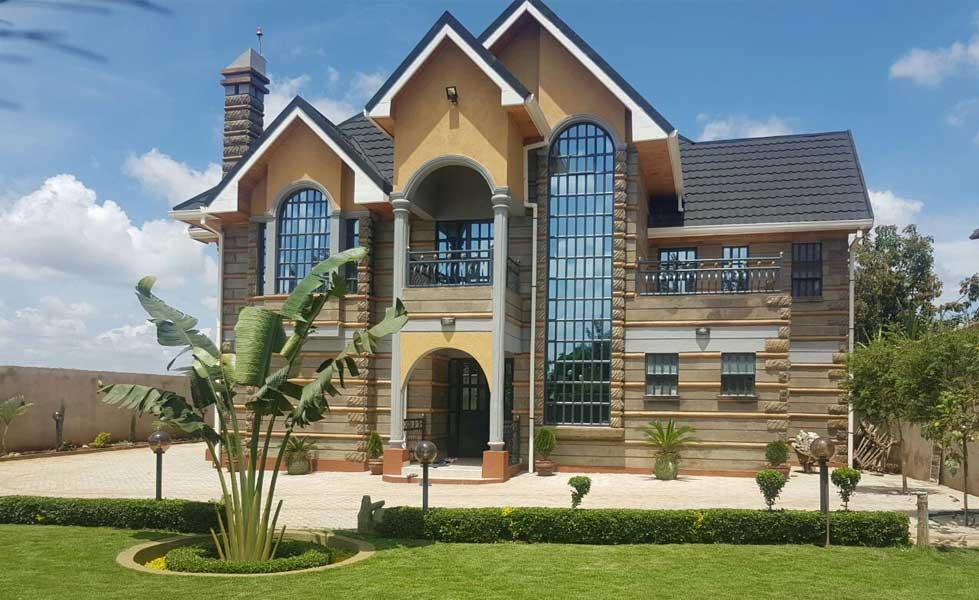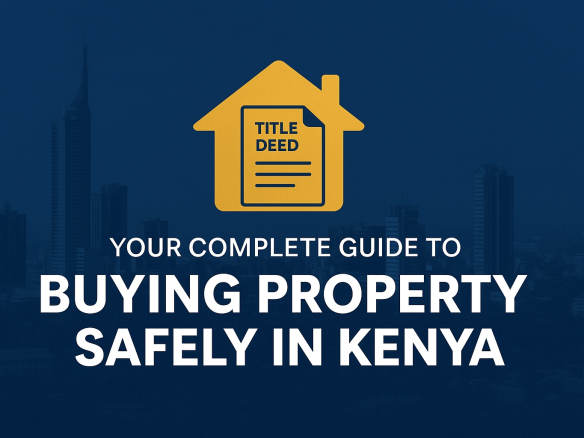Steps to Follow When Purchasing Property from the Diaspora in Kenya (Complete 2025 Guide)
Purchasing property in Kenya while living abroad is one of the most rewarding investments for Kenyans in the diaspora. Whether you’re buying land, a house, or an apartment, the Kenyan real estate market offers great opportunities for long-term returns. However, buying property from abroad demands careful due diligence, involvement of qualified professionals, and adherence to the legal land transfer processes.
This comprehensive guide outlines every crucial step, from identifying a property to obtaining your title deed — ensuring your investment is safe, legitimate, and profitable.
1. Identify the Right Property for Your Investment Goals
The first step is defining what kind of property you want to purchase. This could be:
Residential plots in developing estates near Nairobi, Nakuru, or Kisumu
Commercial properties for rental or business use
Agricultural land for farming or agribusiness ventures
Holiday homes or Airbnb-ready villas in tourism hotspots like Diani, Watamu, Naivasha, or Nanyuki
Ensure that the property type aligns with your financial goals, risk appetite, and long-term plans.
2. Engage Registered Real Estate Professionals
Since you are purchasing from abroad, it’s crucial to involve registered and licensed professionals in Kenya. These include:
A Registered Real Estate Agent (under the Estate Agents Registration Board – EARB)
A Registered Valuer (under the VRB & Institution of Surveyors of Kenya – ISK)
A Licensed Land Surveyor (under the Land Surveyors Board of Kenya)
A Qualified Advocate specializing in property law
Each of these experts plays a unique role in ensuring your investment is safe and compliant with Kenyan property laws.
3. Conduct Thorough Due Diligence
This is the most critical step when buying property in Kenya from the diaspora. Due diligence helps you verify ownership, location, legality, and physical boundaries of the property before paying a single cent.
Key due diligence steps include:
Land Search at the Ministry of Lands via Ardhisasa to confirm ownership and check for any encumbrances, caveats, or disputes.
Verification of Title Deed Authenticity — your advocate should confirm that the title deed number matches records at the Lands Registry.
Boundary Verification by a Surveyor — a licensed surveyor should visit the property to confirm the beacons, size, and location match the Registry Index Map (RIM).
Site Inspection and Valuation — a valuer confirms the property’s market value and ensures there are no illegal structures or occupation on the land.
Remember: Lack of due diligence is the most common cause of fraud and land disputes in Kenya. Always verify every document and every professional’s credentials.
4. Role of a Surveyor in the Property Purchase Process
A registered surveyor plays a vital role in safeguarding your investment by ensuring the property you intend to buy is genuine, correctly demarcated, and legally recognized.
Here’s what a surveyor does:
Verifies Property Boundaries: Confirms that the beacons (boundary marks) are intact and correspond to the official survey map.
Checks for Encroachments: Ensures the land is not overlapping with neighboring plots or public land.
Prepares Mutation or Subdivision Plans: If the land is being subdivided, the surveyor prepares and registers the new maps with the Survey of Kenya.
Confirms Land Reference Number (L.R. No.): Ensures the plot’s LR number matches the official registry records.
Advises on Land Size and Location Accuracy: Especially crucial when purchasing from abroad to avoid buying smaller parcels than what’s advertised.
Engaging a qualified surveyor protects you from boundary disputes, illegal subdivisions, or double allocations, which are common in real estate scams targeting diaspora investors.
5. Hire a Qualified Advocate (Property Lawyer)
Once you’ve identified a property and confirmed its authenticity, your advocate steps in to handle the legal aspects.
The lawyer’s responsibilities include:
Conducting a legal due diligence report on the property
Preparing and reviewing the Sale Agreement
Obtaining the necessary Land Control Board (LCB) consent for agricultural land
Overseeing stamp duty assessment, payment, and transfer registration
If you’re living abroad, your advocate will require Power of Attorney (PoA), allowing them to legally sign documents and complete the process on your behalf. The PoA must be notarized at the Kenyan Embassy or Consulate in your country and registered locally at the Lands Registry.

6. Clear Land Rates and Land Rent
Ensure that all land rates (County Government) and land rent (Ministry of Lands) are up to date.
Obtain:
Rates Clearance Certificate
Land Rent Clearance Certificate
These confirm that the property is free from arrears and municipal liabilities.
7. Sign the Sale Agreement and Pay the Deposit
After due diligence, the advocate drafts the Sale Agreement between the buyer and seller.
Key inclusions in the agreement should be:
Agreed purchase price and payment terms
Completion date
Conditions for transfer and possession
Penalties for breach of contract
A deposit (usually 10%) is paid upon signing, and the balance is paid once all legal conditions are fulfilled.

8. Property Valuation for Stamp Duty
Before transfer, the property must undergo valuation to determine the stamp duty payable to the Kenya Revenue Authority (KRA).
The valuation confirms the market value to ensure proper taxation.
Stamp duty rates are:
4% for urban property
2% for agricultural or rural land
Your advocate and valuer handle the valuation submission to KRA for approval.
9. Payment of Stamp Duty and Transfer of Title
After valuation:
The buyer (or lawyer) pays the stamp duty via KRA’s iTax system.
The Transfer of Land documents are signed by both parties and lodged at the Lands Registry.
The new title deed is processed and issued under your name.
Processing time typically ranges between 2 to 6 weeks, depending on the registry and location.
10. Registration at the Lands Registry
Once the transfer is approved, the Land Registrar updates the records and issues the title deed or lease certificate in your name.
Keep both physical and scanned copies of your title deed securely stored, as these serve as your legal proof of ownership.
11. Development or Property Management
Once ownership is complete, you can:
Begin the development process (building approvals, architectural designs, and NEMA compliance)
Lease or rent the property for income
Hire a property management company to handle rentals and maintenance while you’re abroad
The Importance of Due Diligence — Never Skip
Many Kenyans in the diaspora have lost millions due to skipping due diligence or trusting unverified brokers. Always:
Work with registered surveyors, valuers, and advocates
Conduct title, search, and map verification before payment
Use bank transfers, not cash or mobile money
Confirm physical site visits through trusted representatives or video documentation
Due diligence is your strongest shield against fraud, double allocation, and future legal battles.
Key Documents Required for Land/Property Transfer in Kenya
Copy of Title Deed
National ID / Passport (buyer and seller)
KRA PIN certificate
Sale Agreement
Consent to Transfer (for agricultural land)
Valuation Report
Survey Map and Mutation Plan
Stamp Duty Receipt
Land Rent and Rates Clearance Certificates
Purchasing property in Kenya from the diaspora can be a seamless and rewarding experience when done correctly. Always engage qualified professionals—a surveyor to confirm boundaries, a valuer to assess value, and an advocate to handle the legal transfer.
Above all, due diligence is not optional — it is the foundation of safe property investment in Kenya.





Join The Discussion